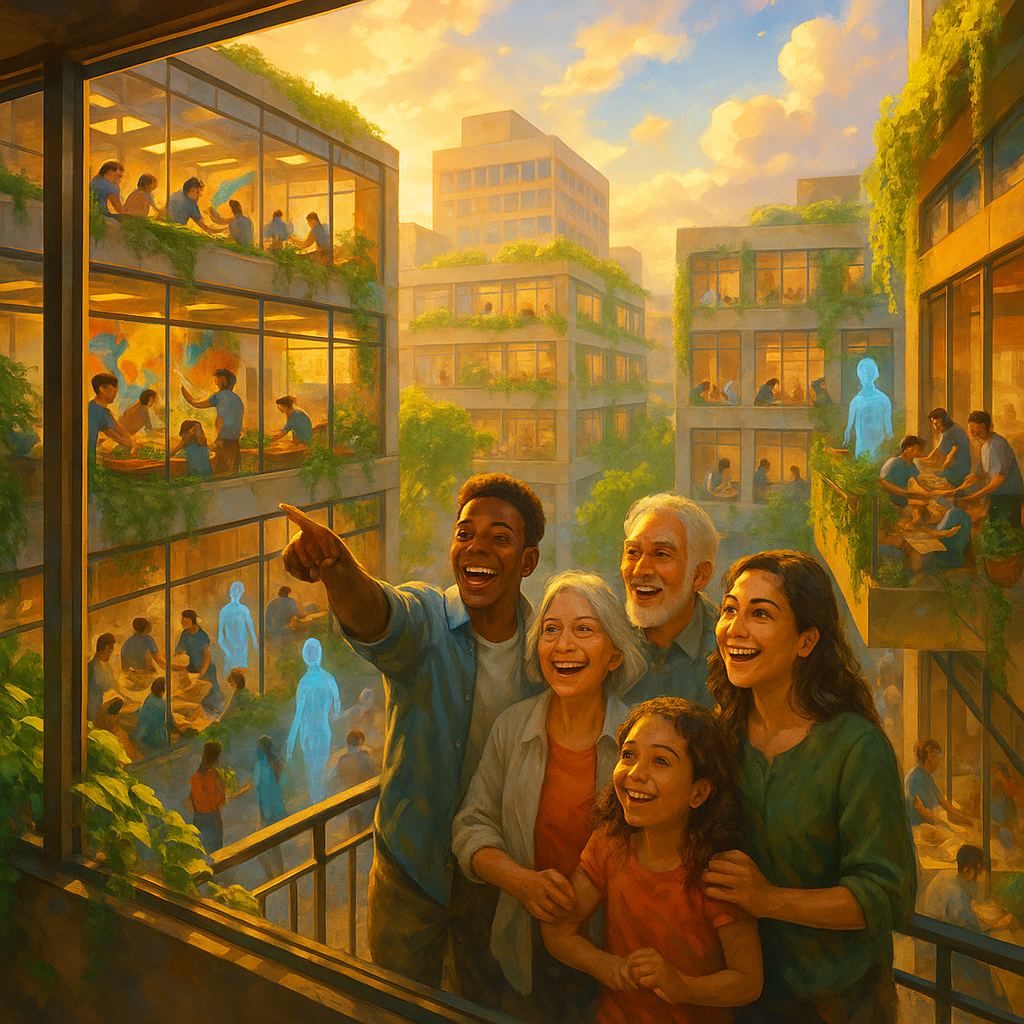
What happens when artificial intelligence doesn’t just change how we work, but multiplies human talent to solve our greatest challenges?
Welcome to the first Solution Sunday—a weekly exploration of how AI-human collaboration could rapidly address humanity’s most pressing problems. While most discussions about AI focus on disruption, we’re exploring transformation: the unprecedented opportunity to apply abundant human talent to challenges that have persisted for millennia.
Today’s focus: ending world hunger.
The Revolution Already Happening
In Maharashtra, India, something remarkable is happening that proves AI can democratize agricultural expertise globally. Suresh Jagtap, a 65-year-old farmer, now receives daily alerts through his Agripilot.ai app that tell him exactly when to water, fertilize, and protect his sugar cane crops. His family has been farming for generations, but with AI assistance, “each sapling produced 10 or more tillers—the shoots that develop into stalks—compared to five or six previously.” [1]
But here’s what makes this truly revolutionary: the AI isn’t replacing agricultural expertise—it’s democratizing it. The technology brings in weather, soil and other data from satellites as well as farm sensors onto a Microsoft data platform, so farmers can see precisely what’s happening at their farm with a few clicks. Generative AI turns technical details into simple daily actions for the farmer—fertilize in areas pinpointed by satellite data, for example, or scout for pests, all delivered through a mobile app in English, Hindi and the local Marathi languages. [1]
This isn’t a future scenario. It’s happening right now, and it’s just the beginning of how AI could help humanity solve food insecurity within our lifetime.
The Scale of the Challenge
About 733 million people around the world are facing hunger, according to the latest 2024 State of Food Security and Nutrition in the World report published by the FAO. [2] Despite some progress in specific areas such as stunting and exclusive breastfeeding, an alarming number of people continue to face food insecurity and malnutrition as global hunger levels have plateaued for three consecutive years, with between 713 and 757 million people undernourished in 2023—approximately 152 million more than in 2019. [3]
Traditional approaches to addressing hunger have been constrained by fundamental limitations: a finite number of agricultural scientists, limited research funding, and restricted access to specialized knowledge. Progress has been measured in decades, not years.
But AI is changing the fundamental equation. For the first time in history, we have the tools to multiply agricultural expertise, accelerate research timelines, and democratize access to advanced farming knowledge globally.
The Talent Multiplication Effect
What’s happening in India demonstrates a pattern that’s scaling globally. The AI for Agriculture Innovation initiative transformed the chili farming for many in Khammam district, India with bot advisory services, AI-based quality testing, and a digital platform to connect buyers and sellers. [4] The AI didn’t replace farmers’ expertise—it amplified it exponentially.
The global AI in agriculture market is projected to grow from USD 1.7 billion in 2023 to USD 4.7 billion by 2028, with a remarkable Compound Annual Growth Rate (CAGR) of 23.1%. [5] This growth reflects real implementation across diverse agricultural contexts:
In India, smallholder farmers have been using AI for agriculture to double their incomes. This includes tools like bot advisors and digital marketplaces. [4]
Global precision agriculture: AGMRI is an advanced crop intelligence platform that combines AI-driven analytics with high-resolution imagery to deliver comprehensive, season-long coverage and insights that help identify and quantify yield-limiting issues in the field. [6]
Smart monitoring systems: Orbit is an AI-driven field scouting mobile application that harnesses satellite-based remote sensing technology to facilitate real-time monitoring of crop health, delivering exceptionally high-resolution satellite imagery on a near-daily basis. [6]
Each example demonstrates the same principle: AI handles data processing and pattern recognition, while humans focus on relationships, cultural adaptation, and creative problem-solving.
The Knowledge Democratization Revolution
Perhaps most significantly, AI is breaking down the barriers that have kept agricultural expertise concentrated in wealthy institutions and corporations.
Imagine this scenario: Maria, a farmer in rural Ecuador, uses freely available AI tools to combine traditional Andean farming knowledge with AI weather analysis, developing drought-resistant techniques that could be adopted across Latin America. She doesn’t need a PhD in agricultural science—she needs curiosity, local knowledge, and access to AI tools that process complex environmental data.
Consider this possibility: Dr. Folashade, a nutritionist in Lagos, could use AI analysis to identify malnutrition patterns across West Africa, developing intervention strategies for implementation by international development organizations. Her nutritional expertise, amplified by AI’s data processing power, creates insights that no single human could generate alone.
These represent the kind of transformation we’re beginning to see worldwide—previews of a world where agricultural expertise is abundant, accessible, and guided by human wisdom about local conditions and community needs.
The Speed of Transformation
Traditional agricultural research moved at the pace of growing seasons—years to test new varieties, decades to develop drought-resistant crops. AI is collapsing these timelines while improving outcomes.
Neural networks can detect diseases like apple scabs with 95% accuracy. Similarly, machine learning algorithms have been used to identify yellow rust in wheat crops, enabling timely interventions. [5]
Current documented improvements include:
- Blue River Technology’s ‘See & Spray’ technology uses high-resolution cameras and AI algorithms to identify weeds among crops, allowing for precise herbicide application, reducing usage by up to 90% compared to traditional methods. [7]
- CropX soil sensors track soil, water, and crop conditions with high precision in near real-time, providing agronomic recommendations for irrigation, nutrient management, and more. [6]
Real-time optimization: Farmers can now receive instant optimization advice based on satellite imagery, weather data, and soil analysis—insights that would have required teams of specialists visiting each farm.
The Abundance Mindset Shift
What’s emerging isn’t just technological progress—it’s a fundamental shift from scarcity to abundance thinking about agricultural expertise.
Traditional approaches assumed limited knowledge: a finite number of agricultural scientists, restricted research funding, and exclusive access to specialized insights. This scarcity mindset created competition for resources and slowed progress.
AI-human collaboration is creating knowledge abundance: agricultural expertise that scales globally, research that accelerates exponentially, and scientific insights that transcend geographic and economic barriers.
But this abundance only emerges when humans and AI systems complement rather than compete with each other. The transformation happens when AI handles routine analysis and humans focus on creativity, relationships, and ethical judgment about implementation priorities.
The Human Elements That Matter Most
In this AI-amplified agricultural future, certain uniquely human capabilities become more valuable, not less:
Cultural Wisdom: Understanding how farming practices fit within local traditions and social structures—something no AI can replicate.
Relationship Building: Creating trust with farming communities, especially important when introducing new techniques.
Ethical Judgment: Deciding which innovations should be prioritized based on human needs rather than just technical feasibility.
Creative Problem-Solving: Adapting AI insights to unpredictable local conditions and unexpected challenges.
Systems Thinking: Understanding how agricultural changes affect entire communities and ecosystems.
The Path to Ending Hunger
With AI multiplying human agricultural talent, ending world hunger becomes not just possible, but achievable within our lifetime. Given the exponential pace of AI development and its rapid global adoption—we’ve seen agricultural AI capabilities advance more in the past five years than in the previous fifty—I believe these transformations could happen even faster than traditional projections suggest. Here’s how the transformation could unfold:
Years 1-3: AI tools become accessible to farming communities globally, providing personalized advice that increases yields by 20-30% while reducing resource usage—building on current documented successes.
Years 3-7: Accelerated crop development produces varieties adapted to climate change, while AI-optimized distribution systems eliminate food waste and ensure efficient allocation.
Years 7-15: Integration of AI insights with local knowledge creates sustainable agricultural systems that produce abundance while regenerating ecosystems.
Years 15-25: Food production becomes so efficient and well-distributed that hunger shifts from a scarcity problem to a logistics and social organization challenge—problems humans are uniquely suited to solve.
Your Role in the Food Security Revolution
This transformation creates new possibilities for individual contribution to solving hunger:
Agricultural Professionals can focus on creative problem-solving, community engagement, and innovative applications of AI insights rather than routine data analysis.
Technology Workers can contribute to developing AI tools that are accessible to farming communities worldwide.
Entrepreneurs can build businesses that connect AI agricultural insights with local implementation.
Educators can help farming communities understand and adapt AI tools to their specific contexts.
Citizens can support policies and organizations working toward AI-human collaboration in agriculture.
Most importantly, you don’t need to be an agricultural expert to contribute. The democratization of expertise means that curiosity, creativity, and commitment to solving hunger can lead to meaningful impact regardless of your background.
The Choice Before Us
The technology to end world hunger already exists. AI systems can accelerate research, democratize expertise, and optimize resource usage. The question isn’t whether this is technically possible—it’s whether we’ll choose to organize ourselves around this opportunity.
We could continue treating food security as an intractable problem requiring gradual progress over generations. Or we could recognize that AI-human collaboration makes rapid transformation not just possible, but inevitable if we choose to pursue it.
The early evidence suggests we could eliminate hunger as a global problem within 25 years—faster than we eliminated smallpox, and with tools that become more powerful every year.
Looking Ahead
Next Sunday, we’ll explore how this same AI-human multiplication effect is accelerating medical breakthroughs, potentially ending diseases that have plagued humanity for millennia.
But today’s question is simpler: In a world where agricultural expertise is abundant rather than scarce, where research accelerates exponentially, and where solutions can scale globally, what would you contribute to ending hunger?
The abundant talent revolution isn’t coming—it’s here. The only question is whether we’ll recognize the opportunity and organize ourselves to make the most of it.
What role would you play in ending world hunger if routine agricultural analysis was handled by AI? Share your thoughts and let’s build the conversation around solutions, not just problems.
#SolutionSunday #OptimisticFuture #FoodSecurity #AIforGood #HumanAICollaboration
Welcome to Solution Sunday—where we explore how abundant human talent, amplified by AI, could solve humanity’s greatest challenges. What should we tackle next week?
Sources:
[1] https://news.microsoft.com/source/asia/features/chasing-peak-sugar-indias-sugar-cane-farmers-use-ai-to-predict-weather-fight-pests-and-optimize-harvests/
[2] https://riseagainsthunger.org/articles/733-million-people-face-hunger-2024/
[3] https://www.who.int/news/item/24-07-2024-hunger-numbers-stubbornly-high-for-three-consecutive-years-as-global-crises-deepen–un-report
[4] https://www.weforum.org/stories/2024/01/how-indias-ai-agriculture-boom-could-inspire-the-world/
[5] https://indiaai.gov.in/article/ai-in-agriculture-in-2025-transforming-indian-farms-for-a-sustainable-future
[6] https://www.croplife.com/editorial/best-agriculture-apps/
[7] https://www.basic.ai/blog-post/7-applications-of-ai-in-agriculture

